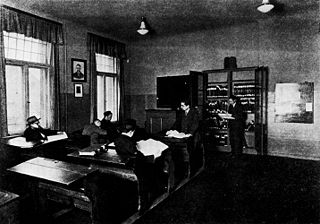Related Research Articles

Zecharias Frankel, also known as Zacharias Frankel was a Bohemian-German rabbi and a historian who studied the historical development of Judaism. He was born in Prague and died in Breslau. He was the founder and, the most eminent member of, the school of historical Judaism, which advocates freedom of research, while upholding the authority of traditional Jewish belief and practice. This school of thought was the intellectual progenitor of Conservative Judaism.

Azriel Hildesheimer was a German rabbi and leader of Orthodox Judaism. He is regarded as a pioneering moderniser of Orthodox Judaism in Germany and as a founder of Modern Orthodox Judaism.
Landesrabbiner are spiritual heads of the Jewish communities of a country, province, or district, particularly in Germany and Austria. The office is a result of the legal condition of the Jews in medieval times when the Jewish communities formed a unit for the purposes of taxation. As the community had to pay certain taxes to the government, the latter had to appoint some one who should be responsible to it for their prompt collection, and who consequently had to be invested with a certain authority. The office of Landesrabbiner had no ecclesiastical meaning until the 18th century, when the various governments began to consider it their duty to care for the spiritual welfare of the Jews. Such ecclesiastical authority, owing to the strictly congregational constitution of the communities, never took root among the Jews.

Aaron Tänzer was a rabbi in Austria and Germany, chaplain and author.
Jakob Guttmann was a German theologian and philosopher of religion (Religionsphilosoph). He officiated as chief rabbi of the Land rabbinate of Hildesheim between 1874 and 1892. Thereafter he served as rabbi in Breslau until his death.

The Hildesheimer Rabbinical Seminary was founded in Berlin on 22 October 1873 by Rabbi Dr. Israel Hildesheimer for the training of rabbis in the tradition of Orthodox Judaism.
Markus Horovitz was a Hungarian rabbi and historian.

Abraham (Adolf) Berliner was a German theologian and historian, born in Obersitzko, in the Grand Duchy of Posen, Prussia. He received his first education under his father, who was teacher in Obersitzko. He continued his education under various rabbis, preparing himself at the same time for the University of Leipzig, where he received the degree of doctor of philosophy.

David Kaufmann was a Jewish-Austrian scholar born at Kojetín, Moravia. From 1861 to 1867 he attended the gymnasium at Kroměříž, Moravia, where he studied the Bible and Talmud with Jacob Brüll, rabbi of Kojetín, and with the latter's son Nehemiah.

Wilhelm Bacher was a Jewish Hungarian scholar, rabbi, Orientalist and linguist, born in Liptó-Szent-Miklós, Hungary to the Hebrew writer Simon Bacher. Wilhelm was himself a prolific writer, authoring or co-authoring approximately 750 works. He was a contributor to many encyclopedias, and was a major contributor to the landmark Jewish Encyclopedia throughout all its 12 volumes. Although almost all of Bacher's works were written in German or Hungarian, at the urging of Hayyim Nahman Bialik many were subsequently translated into Hebrew by Alexander Siskind Rabinovitz.
The history of the Jews in Laupheim began in the first half of the 18th century. Until the second half of the 19th century, the Jewish community in Laupheim, expanded continuously to become the largest of its kind in Württemberg. During this period, the Jewish community gradually assimilated to its Christian surroundings and its members prospered until the beginning of the Nazi-period in 1933. With the deportation of the last remaining Jews in 1942, more than 200 years of Jewish history in Laupheim forcibly came to an end.

Moritz Güdemann was an Austrian rabbi and historian. He served as chief rabbi of Vienna.

Levi Herzfeld was a German rabbi and historian.

Gustav Karpeles was a German Jewish historian of literature and editor; son of Elijah Karpeles.
Rabbi Dr. Adolf Rosenzweig was a German moderate liberal rabbi and Biblical and Talmudic scholar. In his publications he dealt with historical and archaeological matters.
Israel Meir Freimann was a Polish-born German rabbi, philosopher, and orientalist.
Leopold Jakob Jehuda Treitel was a German Jewish classical scholar in the late 19th and early 20th century, and the last rabbi of the Jewish community in the town of Laupheim, then Württemberg, Southern Germany.

Heinemann Vogelstein was a German rabbi and leader of Reform Judaism in Germany.

Samuel Klein was a Hungarian-born rabbi, historian and historical geographer in Mandatory Palestine.
Hartwig HirschfeldMRAS was a Prussian-born British Orientalist, bibliographer, and educator. His particular scholarly interest lay in Arabic Jewish literature and in the relationship between Jewish and Arab cultures. He is best known for his editions of Judah Halevi's Kuzari—which he published in its original Judeo-Arabic and in Hebrew, German and English translations—and his studies on the Cairo Geniza.
References
- ↑ Arnsberg, Paul. Die jüdischen Gemeinden in Hessen. [Frankfurt a.M.]: Societäts-Verl, 1972.
- ↑ Meckseper, Cord. Stadt im Wandel: Kunst und Kultur des Bürgertums in Norddeutschland 1150-1650: Landesausstellung Niedersachsen 1985. Stuttgart: Cantz, 1985.
- ↑ Herlitz, Georg, Bruno Kirschner, and Ismar Elbogen. Jüdisches Lexikon: ein enzyklopädisches Handbuch des jüdischen Wissens. Berlin: Jüdischer Verlag, 1927.